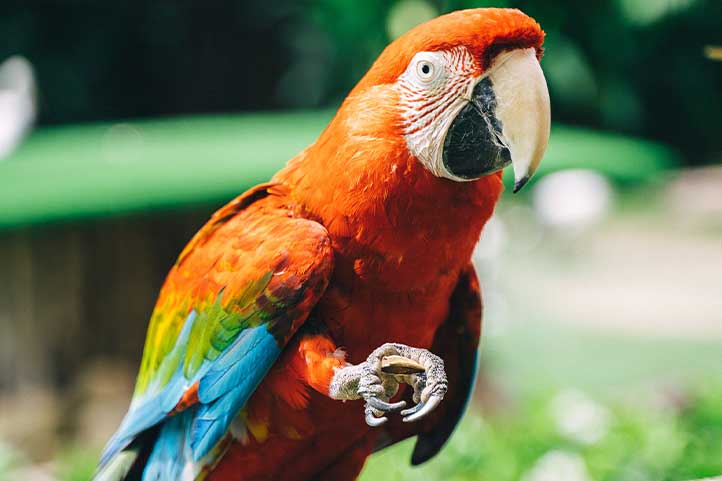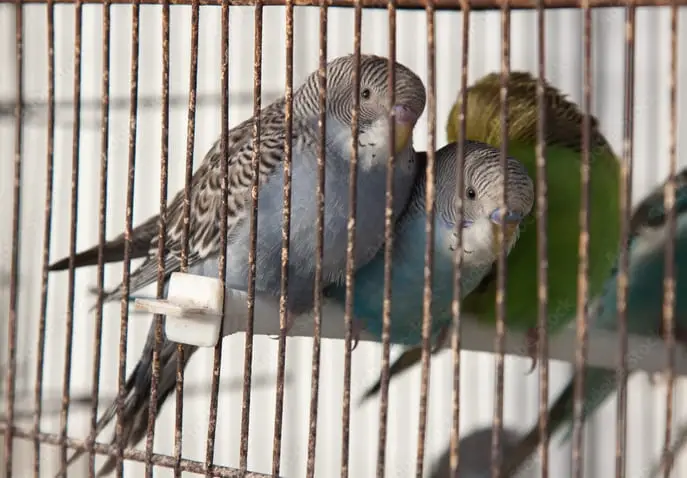Translated by Nick R
Birds are such liars when it comes to showing signs of serious illness, it’s not always easy to detect whether they are in good health or not. Here’s how to identify the signs of a dying bird.
Table of Contents
Common causes of bird death
It’s really important that you identify the physical and behavioral signs that tell you that your bird is about to leave for good. Your pet bird can die from different causes, there are 3 main ones:
Death by accident
Not all birds are lucky enough to die peacefully over the years and die from accidents, being one of the most common causes of death in pet birds. Your bird can die from a stroke or injury if you don’t provide first aid.
Death due to disease
On the other hand, many birds die due to neglected or very serious diseases. Vaccinations are essential to prevent many of the most lethal diseases.
Natural death
A bird that dies of natural causes has less painful ailments and is usually due to advanced age as it ages. Here it is worth noting the life expectancy of the animal. But what is life expectancy and what is the life expectancy of birds?
Life expectancy of birds
Life expectancy is the maximum average lifespan. This time differs from one bird to another and from one species to another. Biologically, some can live for more than half a century and others for barely a decade. Therefore, keep in mind that before drawing conclusions, the age of your friend is fundamental. Some birds are very long-lived and others not so long-lived, although they may live longer in captivity.
However, life as a domestic bird can work against or for the animal, depending on your care. Below, you can find out the life expectancy of the most common pet birds:
- Canaries live approximately 6 to 20 years.
- Budgies live up to a maximum of 21 years.
- Cockatiels have a life expectancy of 8 to 15 years.
- Lovebirds live from 15 to 25 years.
- Parrots are the longest-lived and can live up to 80 years (larger species).
- Goldfinches live from 7 to 10 years.
- Zebra diamonds have a life expectancy between 5 and 12 years.
- Chickens live approximately 5 to 10 years.
What are the signs that my bird will die?
Speaking of death by natural causes, there are 5 indicators to know if your pet bird is going to die soon, a task that is not always very easy to perform due to the resistance of these animals and their instinct that drives them to hide symptoms of disease or the consequences of senescence (old age) to defend themselves from predators.
When your friend is in its last days, it will show some signs that, with observation and good follow-up, can be quickly detected. Being able to detect them will help you to be prepared for this difficult moment and to know how to act appropriately before the eventual and unexpected death of your pet.
1. Lethargy is a sign that your bird will die
Birds are very active animals, with high metabolic rates (they eat constantly) and it is not normal for them to stay still for long periods of time. If the bird remains still for a long time it is because it has entered a state of lethargy, a state of inactivity and tiredness, spending more time sleeping and not wanting to leave the cage as usual.
This is the main symptom when your friend’s health is not good and it is very evident, you’ll see. The bird will sit on the floor, usually at the back or in a corner of the cage, not wanting to climb up to the perches. If you observe your canary or parrot for about 5 minutes, you will notice that, in that time, it will usually move from one side to the other about “a thousand times”.
2. Breathing is a sign that your bird will die
If your bird’s breathing becomes inconsistent or faster, or the animal shows difficulty breathing, it is a sign that its life is in danger. Many diseases manifest themselves through this symptom. However, it takes on more relevance when the animal is about to die because the consequences will be unavoidable.
At this point, the bird will keep its beak open because of the difficulty in breathing, it is much more difficult for it to inflate its lungs with air. As a bird ages its physiology changes and its physical activity decreases. It no longer flutters and jumps as often as it might cause a fracture more easily at an advanced age. These are progressive changes that manifest themselves more intensely days before death.
What about the bird’s chest?
If you notice that your bird has irregular swelling when breathing in the chest or keel it could be on the verge of death. This sign shows that the bird is having difficulty breathing.
3. Physical signs that your bird is dying
The physical signs are more obvious than behavioral ones and may be the first ones that set off the alarm bells. Pay close attention to your pet’s body and its manifestations of discomfort.
The bird trembles uncontrollably
Body trembling is a noticeable sign, evidencing a drop in your bird’s temperature. These consecutive and uncontrollable movements are part of the natural mechanism of thermoregulation in animals and consist of shaking the body to increase the body temperature when it has dropped beyond its normal levels, which are very high in birds (approximately between 35°C and 43°C).
This sign is much more evident when the animal lives in a warm climate, so it is unlikely that the cause of the shivering is cold.
What about the bird’s feathers?
Feathers are one of the most relevant phenotypic characteristics in birds. They have different functions from flying, thermoregulation, and mating. When birds are in poor health, feathers serve to detect symptoms of the disease. Feathers are also useful to detect if our bird is dying, a condition in which the feathers look duller and less abundant than before, falling off more frequently.
What about the bird’s eyes?
The eyes of dying birds become dull and opaque, lifeless. Also, there will be swelling around the eyes. At first, you see its eyes half open and more and more closed as time goes by, a sign that it is dying.
4. The attitude is a sign that your bird will die
Your bird’s behavior in its last moments is very important because it is very telling, but also more difficult to notice. There are different behaviors that function as alarms that something is wrong: here are some of them.
The bird is apathetic
The bird is apathetic to environmental stimuli and is not interested in what is going on around, maintaining a fixed, sleepy stare and puffing up posture. It begins to show solitary behavior, moving away from the group.
Your bird stops singing
If your pet is a songbird and stops singing it is a bad symptom, a songbird doesn’t stop singing overnight, it’s a sacrilege against its own nature. If you notice this behavior in your canary progressively, perhaps, its time is arriving. Keep in mind that it is a little more complicated to detect it in females, which are less bullish than males.
Your bird stops talking
For chattering birds it gets ugly when they stop talking, just imagine a parrot or cockatoo that doesn’t talk or make musical noises. Yes, very strange. This can happen progressively and is a sign that the animal is on its last legs. This sign is more evident in males than in females.
Your bird gets too close to you
Domesticated birds, like conventional pets such as dogs or cats, generate an affectionate bond with their human friend. That is why, in many cases, when these pets are in their last hours they seek refuge with their last breath in their owner as a way of saying goodbye and dying close to them.
The bird fluffs its feathers
Puffing up feathers is one of the most important signs of whether your bird is in good health or is about to die. This behavior is associated with weight loss and low temperatures.
5. Posture is a sign that your bird will die
One of the most important and telling signs is the posture that your friend starts to take when it runs out of vital energy and is very weak. When the bird can no longer stand with straight legs and body upright, keeping the legs bent or otherwise not even being able to stand up; it is the final stretch.
I want to be honest with you. A bird in this condition will die. It’s sad and inevitable. Some birds will be able to stand for a while, but they will show progressive deterioration and stop moving until they die.
How much time does your bird have left before it dies?
Regarding how much time a dying bird has left, there is no exact time estimate. But, after your bird starts showing signs, it may be a matter of days before it completes its life cycle and dies. I advise you to take it in the best way, it is a well-deserved rest, the vital force of your friend has diminished and the most important thing in these instances is to prepare a burial or a ritual to say goodbye as it deserves.
It is a very difficult time, I understand. I recently lost a feathered friend as well and it is more painful than you can imagine. I hope you had a great time with him while he was alive, lots of strength!
You may be interested in What to do when your bird dies?


